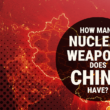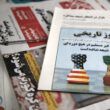Nuclear weapons: Not taboo enough
By Mustafa Kibaroglu, August 6, 2015
I wish I could argue that the world had properly absorbed the lessons of the Hiroshima and Nagasaki bombings. Unfortunately, I must argue the opposite.
Why? First and foremost, large numbers of people around the world believe that dropping the atomic bombs—regardless of how catastrophic the consequences were for the people of Hiroshima and Nagasaki—saved lives, perhaps millions of them, by bringing World War II to a prompt conclusion. But history doesn't substantiate this point of view. Japan had already lost much ground in the Asia-Pacific region. Europe's fascist regimes had fallen; the war had ended in Europe, North Africa, and the Middle East; and Japan was left to fight its enemies alone. Under such circumstances the Japanese Empire couldn't have prolonged the war much longer in any case. As Dwight Eisenhower put it, “[T]he Japanese were ready to surrender and it wasn’t necessary to hit them with that awful thing.”
Second, no one was taken to court as a result of Hiroshima and Nagasaki, and this has had a profound impact on how the bombings are perceived. German and Japanese war criminals faced the Nuremberg and Tokyo tribunals, but a man such as General Curtis LeMay—whose air force burned cities from one end of Japan to the other, killing hundreds of thousands of civilians even before Hiroshima and Nagasaki—faced no such justice. "If we'd lost the war," LeMay later said, "we'd all have been prosecuted as war criminals." But the United States did not lose the war, and in the decades since there hasn't been enough debate about the legality of the bombings. As a result, nuclear weapons have gained a certain legitimacy.
Third, members of the nuclear club—the United States and Russia, for example—have sometimes issued nuclear threats in order to achieve policy goals. The goals have ranged from deterring adversaries' military operations to effecting regime change. Unfortunately, threats such as these can convince national leaders that preserving their regimes requires establishing a nuclear deterrent—as has been the case with North Korea. But then, leaders throughout history have wanted to acquire the most powerful weapons of their era. Thus it is difficult to maintain optimism about prospects for the nonproliferation regime over the coming decades.
Finally, practitioners of international relations often treat nuclear deterrence as if it were indisputable fact. According to a common telling of Cold War history, the United States and the Soviet Union were forced by mutual assured destruction and one another's second-strike capability to exercise restraint. This prevented crises from erupting into dangerous conflicts. But the conditions that prevailed in that era were highly peculiar. For example, the most populated areas of the United States and Soviet Union were separated by enormous distances. If either side had launched a nuclear attack, the other side would have had time to launch a reprisal. This indeed made deterrence fairly reliable. What international security analysts often fail to recognize is that deterrence is less reliable in a compact region such as the Middle East. Also, in that highly volatile region and elsewhere, hatreds between nations are sometimes so intense that, if certain leaders had nuclear weapons at their disposal, they might have used them already—regardless of the consequences (even to themselves). Many people have not internalized the tragedy that befell the Japanese people with the Hiroshima and Nagasaki bombings, and likewise they sometimes lack empathy for fellow human beings in rival nations.
The international community has made concerted, elaborate efforts to prevent nuclear proliferation. But technology for building nuclear weapons continues to spread. The possibility of nuclear weapons falling into the hands of terrorist organizations with apocalyptic views can by no means be disregarded. I fear that seven more decades will not elapse without the wartime detonation of a nuclear weapon.
Topics: Nuclear Weapons
Share: [addthis tool="addthis_inline_share_toolbox"]














